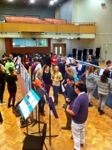Digital Literacy Presentation
For the module on Trends in eLearning I have prepared a short clip using Camtasia studio to discuss briefly digital literacy of Academics in Higher Education.
I prepared the presentation with the intention of publishing it in articulate, however the licence ran out so I went straight to Camtasia. I have to say Camtasia was so intuitive and I will definitely use it again. The recording of the audio tracks was very easy and when the file was prepared I uploaded it to YouTube. YouTube prompted me to add the correct file type (mp4) produced through Camtasia. I will encourage more people to use this (staff and students). The day of the presentations I was unable to attend the class in person but I was happy that my presentation would present my thoughts on digital literacy skills of Academics in higher education, hopefully in an entertaining way. I have uploaded my presentation to the discussion board so my peers can give me feedback.

